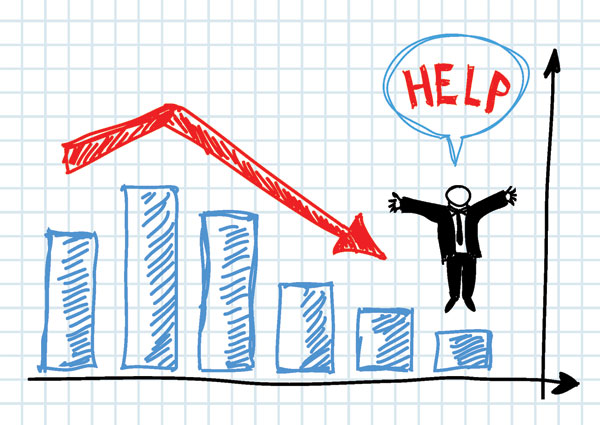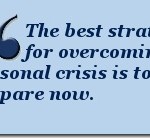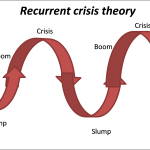“Rock bottom became the solid foundation on which I rebuilt my life” – J K Rowling
We’ve all enjoyed the good times, but when the bad times come it’s not one hammer blow but a succession of crises queueing up like buses. Let’s be honest about this, everyone goes through peaks and troughs in life. I’ve had one recently and am still not completely out of the woods, but I can do something about it.
It’s easy to be in denial and pretend everything is fine. You put on a happy public face and hope you can shrug off one or two issues, but the welter suddenly becomes too hard to bear and suddenly coping feels ever more impossible. With each knock your confidence an joie de vivre gradually erodes. The more encumbered you feel, each additional disaster adds weight to the feeling of helplessness, and with it the positive, resourceful attitude that carried you through leaches away. A spiral of discontent follows: more intractable worries to deal with, and the less able you feel to do anything about them, or even face up to them.
There are two ways you can deal with this kind of situation, and they equate to the classic choice: fight or flight. Panicking and/or running away is perfectly rational though it doesn’t solve the problem – and ignoring it is just as bad as physically running away and hiding. It might feel good in the short term but doesn’t solve anything.
The secret, if there is one, is to stay calm and positive, pick yourself up again, though at the time your mind and body scream out to panic and act in some unspecified irrational manner. Then follow these instructions, all of which are patently obvious but which will be anything but when you feel stressed:
- Write down the issues in a methodical fashion so you can visualise the current problems – but keep future issues on the next page; one step at a time. Don’t see them up close and personal but in the bigger perspective, putting yourself in the third person and looking at the issues dispassionately. Talking to a few people to gain perspective is a good idea, but it may take courage to reach that point.
- Next list all the possible solutions plus two columns for the pluses and minuses with each. Rank them in order of preference so the most beneficial are labelled. It may be that you take more than one so there are always further options if one fails to deliver what you need.
- Then identify who you need to communicate with to help you achieve the best available solution, including every possible source of help and what it is they can do for you. For example, you may include in the list friends and family, maybe your boss at work, your bank manager, your GP, Citizen’s Advice, lots of professional sources of help whose purpose is to get you out of a fix.
- Try to estimate how they feel towards you and your problems now, and where they need to be to give you the help you need. From this you should be able to identify what you need to do or say to get them on board and how you can approach them.
- Once you have a list of actions, JUST DO IT! Don’t put it off, face the problems and you will feel better. It may take time to sort everything out, but just one small step can take some of the burden from your shoulders.
- Persevere! Don’t let up until the plan is complete and you are on firm ground once more.
- Plan ahead so you don’t ever get into the same situation again. Prevention is always better than cure, and once you’ve been through the situation once you will be all the more motivated to prevent that pain and suffering from recurring.
- Tell others about your story and form your own self-help group. There is no better feeling than knowing you’re not alone and helping others recover from the same crisis that afflicted you.
Some more tips about dealing with a crisis follow. Find things that work for you and good luck in dealing with the crisis!
12 Tip for Surviving Personal Crisis
1. Benefit or Don’t Do It — Start Saying “No”
Many people do not understand this and think that self-sacrifice is what being charitable is all about. If you walked into a meeting and were asked to show the ROI of taking two dozen cookies to the bake sale or running in the charity marathon — what would you say? If it made you feel good to bake the cookies or run the marathon, then that is a benefit. But if you work full time, are a single parent, or not, if it caused friction in your home, strained your schedule or strapped you financially — which believe me, it can, especially if you are on a tight budget, then there quite possibly was no return on your personal investment.Start saying “no.” You do not have to say yes to everything. Think of you — your body, your life — as your own personal business where you are the CEO. Saying “no,” isn’t being selfish — it is taking control and managing your life.
2. Be Mindful of How Much Time You Spend Doing Any One Thing
Just like you wouldn’t spend your whole work day in your email inbox or cruising through YouTube videos, you shouldn’t spend too much time on any one thing — like drinking or smoking or eating/not eating or exercising too much or lying in bed all day. Get up and get balanced, promote thyself. Find your balance and hang on to it. I usually go for a walk or do yoga when I start to feel even the smallest amount of stress — experience has shown me how escalation occurs and I have learned to prevent it. When in doubt, always refer back to #1.3. Avoid Social Addiction
Some have claimed that Facebook and the endless stream of self-promotion can lead to depression. I don’t see it, but I also don’t hang out on FB all day. It might seem like I do, but I don’t — I have found the balance I need to not get sucked into the virtual world, but also get the work done that I need to get done on the multiple social channels and email accounts (online communication) we have today. Pick up the phone and call a real live voice. You’d be surprised how great it feels to step away from the keyboard and just breathe. More and more people are ditching their social profiles. Don’t expect this from me, but I have figured out a balance for myself. Not everyone can do that, so limit how much time you spend in email and social networks. Set a timer if you have to or schedule in your calendar the time you spend online.4. Keep a Calendar
And by keep a calendar, I mean keep a calendar. Schedule your day, schedule the hours and minutes if you have to. Just stick to a schedule. It will give you the structure you need to survive during a personal crisis or time of trial. When I had my first baby many years ago, I set up a weekly schedule for errands so I wouldn’t go nuts — Mondays to the grocery store; Tuesdays visit Grandma; Wednesdays go to the library; Thursdays, get a donut; Fridays, post office and pay bills. It worked. Set a schedule and stick to it. DO whatever you have to do — get an old-school paper or wall calendar or use an online version with alerts and reminders if you need to. I actually use both — old-school and online.Gentle Reminder: These tips have worked for me as preparation to cope during a personal crisis or severe trial, and sticking to them helped me get through the crisis — to survive it. Thinking about them doesn’t make them work — they don’t work if you don’t do them. Pretty simple.
5. Write Down Your Goals
We are told this so often. Goals are not the same thing as dreams — goals should be fully attainable, but not so easy that you don’t have to work hard to attain them. It is the work that makes them worthwhile — the achievement is everything. Writing them down forces you to give them words and words give your goals power. In giving your goals power, you are able to see the potential of a goal attained. Plan them out — figure out what you need to do to reach them and say, “Wow, I made it.” Follow through — a must if this tip will help you cope with a crisis. Do what needs to be done to achieve your goal.6. Put Your Mobile Device Away
Your mobile device keeps you attached to more drama than you need. It makes it easy to become addicted to social media. It makes it way too easy to become overworked and overtired. When you step away from your desk — try this: leave your phone there. I know, crazy. But do you know that most people will leave their identification and money at their desk when they step away, but not their mobile phone? And you could also try this: turn it off. Just turn it off. You don’t need to be connected to everyone, every second of every day. The release and relief will confound you. You will remember what it was like to have conversations while looking at someone’s face. Put it away, disconnect, turn it off. Enjoy the silence. You may even find the peace you need to think, to cope, to regain your will to survive.I stopped taking my phone with me when I walk my dog about two years ago — occasionally, I take it to be used as a camera if it is an exceptional day. But the peace and commune provide the perfect respite. **This is my favorite tip, and the one that was hardest for me to achieve… interesting how that works.
7. Schedule as Much as You Can Before 2 p.m.
You will be surprised how much you can get done if you plan to do it before lunch, before the day has its way with you. Avoid scheduling meetings or appointments late in the day. You may believe that is your prime time, but it isn’t. We are often sluggish and maybe even depressed after lunch, even more so if you skip lunch or work through it. Our bodies and minds are at their best when they are fully rested, not when they have been beat down by the day. And avoid, as much as possible, being away from home in the evenings. Consider this the gift you give to yourself — that your time off will actually be time off. You can regroup, recharge and reignite. You need it, take it.8. Speak Kindly
Just the other day, I was at my Starbucks and one of favorite baristas was working the register. We were having a friendly chat about his recent camping trip while I paid for my order. The person immediately behind me made a couple grunts and said something foul about our conversation — I am sure this person was just angry because our conversation was light, airy and friendly — while he, it seemed, spoke only in grunts. Speaking kindly to someone can mean so much to them — you just never know. But this is about YOU — it’s about you getting through your crisis. Speaking kindly to others softens the outer crust we often build when we want to protect ourselves, whether we have been hurt or feel slighted in any way. I have learned over the years that when I give kindness — even in the mere tone of voice — kindness comes back to me tenfold and just in time to help me get through one more day, one more hour. When all else fails? The Golden Rule always works. Always. If everyone lived the Golden Rule, truly lived it, there would be no need for laws. Imagine that.9. Take Vacations
Taking a break, an actual break, from your day to day grind is beneficial to your mental and physical health — most likely your soul appreciates it, as well. We work too hard in North America. Many of us never even step away from our desks for lunch, opting to eat at the keyboard. I know I do this. We need to make the time to take the time. Even if you don’t go anywhere exotic or far away, you can choose to decompress. This summer, my family took a staycation. We stayed in our own town and spent time at home “off of work.” We put in a flower garden and built a fire pit area in our backyard. It was a wonderful activity for me to do with my kids and we created fun and new memories of achieving a goal (see #5). Rejuvenation is imperative in order to succeed. Burnout is not a good coping mechanism.10. Take Care of Yourself Before You Take Care of Others
Many working professionals are also balancing private lives that include spouses, children, aging parents, pets or busy extracurricular activities. Before I do anything else in the morning, I brush my teeth — I am taking care of me. And then I go for a walk — I am taking care of me, while I also happen to be taking care of the dog. It’s very hard for many of us to do this, but you must put yourself first. If you don’t take care of you, who will? When a crisis looms or drops in your lap, you will be better able to tackle it if you have been taking care of yourself — giving back to you. Never forget how much you matter. You cannot fully give to others, including your work, if you haven’t taken care of yourself.11. Relive Stress and Release Anxiety
Do something that helps you release anxiety before it has its way with you. I write nearly every day. It has been the single greatest thing I have ever done for me personally, as well as for my career. I have found out so much about myself by writing and pursuing specific trains of thought. Perhaps you could take up writing, or an art of some kind, or learning a new skill, or take up an exercise like power walking, yoga or kayaking. Choose an activity that causes you to thoroughly focus and helps you let go of tension or pent-up anxiety. And make sure you are getting enough sleep. Overtired, overstressed and increased anxiety are a personal crisis waiting to happen.12. Give Yourself a Forward
This is a little trick I implemented into my life when I was in the middle of a major personal crisis. I was going through a divorce and found myself estranged from family and friends. It was a horrible time for me. And I was pursuing my business degree when all this was happening to me. I didn’t know how I was going to cope or if I was even going to make it. Then I remembered a book I had read in a modern dramatic literature class calledBackwards and Forwards, by David Ball. It was written to help actors understand playwriting and screenwriting tactics — many writers will give a clue or a hint in a storyline or script about what the future will bring for a particular character — this is called a forward. Often playwrights will give exposition or background on a character — this is called a backward. I decided that I was the main character of my life and that I was going to create a forward for me: a diploma in my hand. No matter what else happened, I was going to keep seeing that diploma in my hand. I made it. it took several years but I made it. When I stepped up to be handed my diploma, I knew that I could achieve anything that I set my mind to. Give yourself a forward.Life Is a Balancing Act
You stand on your head. You follow through. You spin plates. You deliver. It’s all about gaining the balance, so you can balance the gain. Whatever else you do, remember to live, love and laugh AMAP (as much as possible), because you deserve it.









